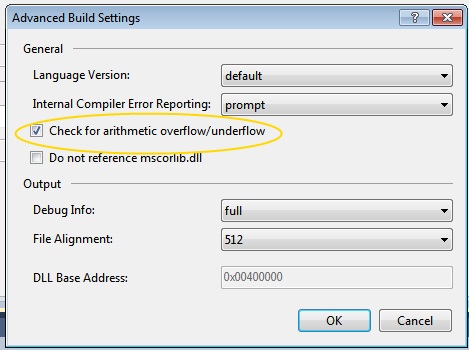#58 – Generate Exceptions on Integer Overflow Using Checked Operator
August 14, 2010 1 Comment
By default, when an overflow occurs as a result of an arithmetic operation on an integer type, the result wraps.
int n1 = int.MaxValue; // 2147483647 (0x7FFFFFFF) n1 = n1 + 1; // Now -2147483648 (wrapped)
You can instead cause an exception to be thrown whenever an integer overflow condition occurs. To do this, use the checked keyword on the expression:
int n1 = int.MaxValue; // 2147483647 (0x7FFFFFFF) n1 = checked(n1 + 1); // Throws OverflowException
You can also use the checked keyword on the statement block that contains the expression:
checked
{
int n1 = int.MaxValue; // 2147483647 (0x7FFFFFFF)
n1 = n1 + 1; // Throws OverflowException
}
You can also make a change to your project so that the default behavior is to throw the exception, even without the checked keyword. Go to Project Properties, click on Build tab, then click on the Advanced button at the bottom of the window. This brings up the Advanced Build Settings dialog.

Pingback: #1,072 – How the Unary Minus Operator Can Fail | 2,000 Things You Should Know About C#